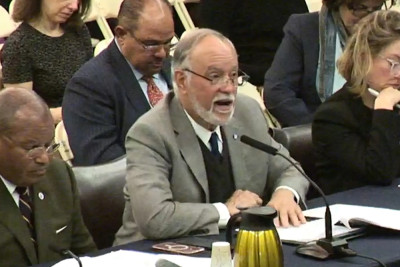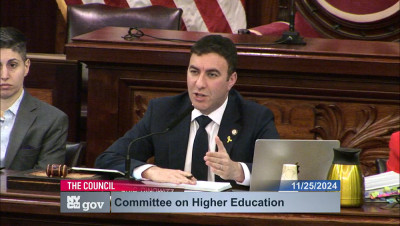

For over three hours on Monday, members of the New York City Council questioned CUNY chancellor Felix Matos-Rodriguez on the uptick in anti-Semitic incidents in the country’s largest public urban university.
“We want a CUNY that is safe and welcoming for all students. Those conversations become very challenging when that data doesn’t exist, or it exists, but it’s not being shared, or you didn’t come prepared with it,” said Bronx Councilman Eric Dinowitz, chair of the Committee on Higher Education.
He was upset that Matos Rodriguez did not have hard numbers on anti-Semitism at CUNY, as Jewish faculty and students are reporting harassment and threats in light of the ongoing war between Israel and Hamas.
“I think, in your heart, you know this is an important issue,” Dinowitz said. “But with that, this hearing is not about what’s in your heart. It’s about CUNY policies, and the policies that have so far failed to meaningfully keep our students safe and make them feel welcome on our CUNY campuses.”
The Council hearing was following up on a ten-month probe in which retired Chief Judge of the state’s highest court Jonathan Lippmann offered recommendations to combat campus anti-Semitism. He noted that CUNY has an online portal for reporting bias, but it does not follow up on what actions are taken in response.
“I feel compelled to note that recently there has been an alarming number of unacceptable anti-Semitic incidents targeting members of the CUNY community,” Lippman wrote in a letter to Gov. Kathy Hochul accompanying the release of the report. “So many people do not feel safe on campuses, and that’s at the heart of the problem.”
In an interview with the New York Post after the report’s publishing, he described CUNY’s portal as a “black box that goes nowhere fast.”
He added that “some faculty stir the pot” by inflaming rather than promoting dialogue. His recommendations included hiring an anti-Semitism monitor, making clear that freedom of speech cannot “tie up the whole university,” and noting that masking at protests “raises serious security concerns.”
In the two months since Lippmann’s report was released, beefed-up security has kept CUNY campuses open for students, but incidents of Jewish events being disrupted and students being heckled for “genocide” have not resulted in disciplinary action.
“I know the frustration of being ignored when incidents get reported. I saw no reprimand for these actions and was left feeling invisible and unsupported by my administration,” said Baruch College student Maya Gavriel.
Brooklyn Councilwoman Inna Vernikov noted that CUNY’s failure to provide hard numbers on anti-Semitic complaints is more than about resources as it is about staff that refuse to confront the issue.
“Not only did a DEI officer at Hunter College try to prevent a religious Jewish student from lodging a complaint about anti-Semitic behavior, but the officer tried to intimidate him – a college freshman at the time – into silence to prevent him from taking the issue further. Sick,” she tweeted.
Vernikov was referring to CUNY’s chief diversity officer, Saly Abd Alla, who previously worked as a director for the Council on American-Islamic Relations in Minnesota. This organization supports boycotting Israel and accuses it of genocide against Palestinians.
She also tore into the chancellor for earning $670,000 while failing to provide answers on campus anti-Semitism. “I can’t wait to work with the incoming administration to defund and discredit any institutions that aren’t addressing vile anti-Semitic protests and rhetoric,” she wrote.
Earlier this semester, Jewish students at Baruch College experienced their school’s failure to enforce security ahead of a Rosh HaShanah event, in which the college could not “guarantee their security.”
Earlier that month, the campus Hillel had its “welcome back” dinner at a Midtown restaurant, with masked protesters outside chanting about genocide and threatening Jewish students trying to attend the event.
The sense that a campus event could proceed but without adequate security enraged supportive elected officials. “What is it going to take to get New York and CUNY to treat campus anti-Semitism with the urgency it demands? Must there be a violent assault? Or the loss of a student’s life?” Bronx Rep. Ritchie Torres wrote.
At the City Council, members spoke of CUNY’s funding as the reason for public oversight, particularly when the institution is not fulfilling the recommendations of the Lippmann report.
“It is outrageous that when we’re having this hearing on such an important topic, that the most rudimentary questions you have been unable to answer,” Manhattan Councilwoman Julie Menin expressed to Matos Rodriguez. “How many complaints to the portal? How many students had to show ID at protests? How many students have been arrested for this conduct? How many faculty have been disciplined? These are all the questions that this panel provided that you cannot provide answers to.”
“It’s just wholly unsatisfactory. It’s not enough just to show up,” Menin said. “The whole point of today is to get answers and to have actionable items.”
By Sergey Kadinsky
City Council Grills CUNY Chief On Antisemitism
Typography
- Smaller Small Medium Big Bigger
- Default Helvetica Segoe Georgia Times
- Reading Mode




